Overcoming Setbacks and Failure to Achieve Success
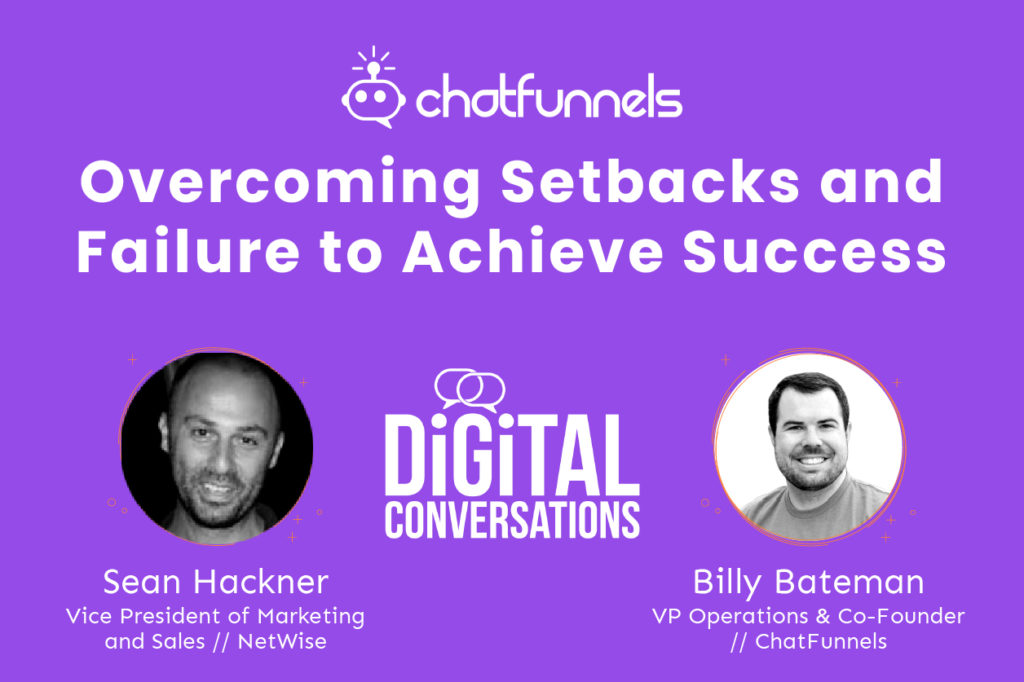
Overview
Sean Hackner shares the importance of persevering and not giving up, even when facing setbacks and failures. He explains how life is a journey and failure is inevitable, therefore it is important to embrace failure and learn from it.
Guest
Sean Hackner is Vice President of marketing and sales at NetWise. He is an experienced President with a demonstrated history of working in all the industries. He is skilled in negotiation, operations management, marketing, sales, and entrepreneurship.
Reference
Intro
Billy Bateman 0:01
All right, everyone. Welcome to the show today. Today I am joined by Sean Hackner, Vice President of Marketing and Sales at NetWise, Sean, great to have you on the show.
Sean Hackner 0:12
Billy. Thanks for having me. My name is Sean Hakuna from NetWise, and I am in charge of sales and marketing. We’re a data company SAS company.
Billy Bateman 1:06
Yeah, I love it, man. I love it. So, before we get into the conversation today, though, tell everyone a little bit about what you did before you on net wise and your journey to get where you are today?
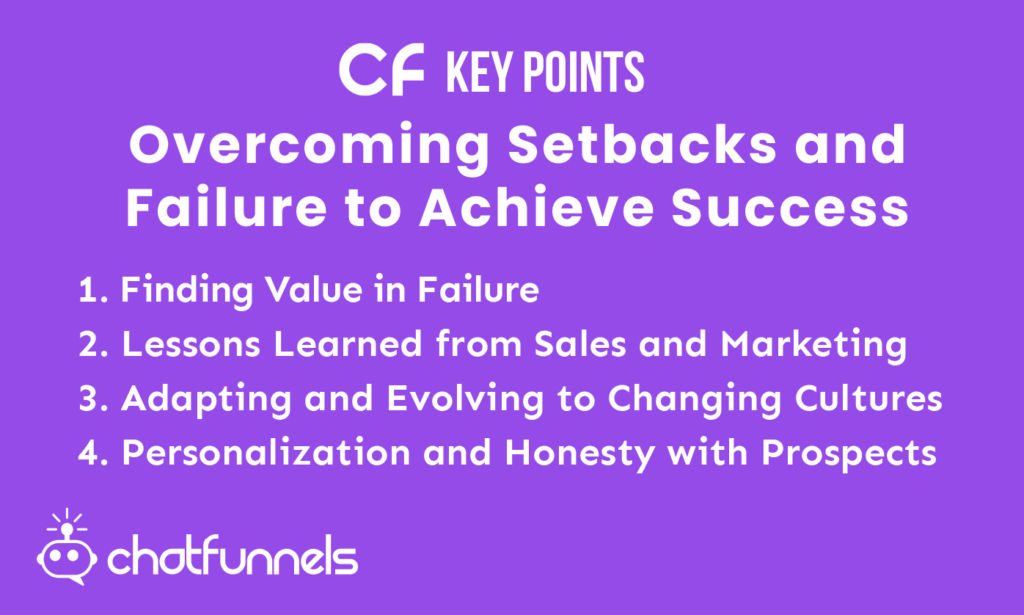
Sean Hackner 1:18
Well, I don’t know if we have the time. But come on. It’s a long journey. It’s crossed across the ocean as well. Right as Yeah, I’m from another country. So even though we speak English. It is a, it’s a different culture, and assimilating into the American culture is has been incredible. And I have an American wife, and she has helped me a lot. And my kids. I’m an American, I’ve been in America longer than I’ve stayed in any other country.
I was born in South Africa, I lived in Italy, and came to America for the dream. This is a great country, with so many great opportunities. And I always tell people, every state is like a different country. There’s so much to learn in every state. And along the way, you know, I’ve started I guess I started in sales, you know, from being a teenager working for my dad and built my way up. Eventually, we had the agency for Corona BIA for South Africa.
And I was selling bit by door to door that the military just before that we had to do army and then jumped over to the States came here, studied, and started. I started the road to success here and taken many different turns like any road, right? Yeah. bumps along the way. And I guess that leads us to our topic. Yeah, you know, the importance of persevering and not giving up because life is, is, is, is a journey and failure is part of it. So, embrace failure. It’s not just the billionaires that talk about their failures on LinkedIn anymore.
Embracing Failure
Billy Bateman 3:20
I agree, man. You know, I’m, I’m not that old. I’m not that young. But I can think of a lot of failures where I tried stuff that did not work out, and some more public than others. But man, I have learned so much more from trying things that didn’t work, then when you try something, it works out. I think he just, it’s human nature just kind of be like, ah, like, it was always going to work, you know, and you just keep doing it. Whereas whenever we, we aren’t successful with something, whether it’s a project, a business, or even a relationship. It forces us to look at why that didn’t work.
Sean Hackner 4:01
So, Billy, is that what you do like in your failures? What do you do when you fail? Like, what’s the next step?
Billy Bateman 4:09
Well, I think, I mean, a lot of people will say, like, oh, you just you just keep going. But I think there’s a step for me, at least in between those where it’s like, okay, that didn’t work. I need to take some time and figure out why that didn’t work. So rather than just jumping on to the next thing. I can learn from it. Internalize, okay, you know, like, I got a business when I was, I was going to graduate school, started a business while I was in graduate school and was out of business almost as quick as I was in business. And I was doing an MBA at the time, and I tell you what, that one venture taught me more about business than the two years going into classes and doing projects and listening to lectures.
Sean Hackner 4:58
At universities here you.
Billy Bateman 5:02
Yeah, I mean, I go get educated, it’s good. But I think there is a lot more to be learned just by doing stuff, you know.
Lessons to be Learned
Sean Hackner 5:13
That’s why I lost because that’s a good point. And I think that comes with age, right? When you’re young, you’re just willing to go, just keep going right? Just through it. But as you get older, you start failures or lessons, and lessons are meant to be learned. So, pausing for that brief moment, and just looking at, you know, what you could have done better, what went wrong, what went right? You know, because I’m sure there were some things that went right.
And those are lessons that can follow you through life, just like you said, man that’s taught you some of the lessons I learned when I was really young and followed me through and you know, we fail all the time, and especially with us in sales. And now with marketing, right? Marketing. No one has a golden bullet, right? It’s a trial and error, because you don’t know. So, you want to make sure.
And I always say, a person makes the best decisions they can. At that point, looking back, we can always say, oh, that was a bad one. That was a good one, right? But at the time we make in with the data, we have the best decisions we can. And that’s like marketing, that’s why we do A/B testing and see, you know, what’s working, what’s not working. So being able to pivot is just as important, you know, not just failure, but when things are not going right.
You know, I always give the example of in any sports at the halftime whistle. Some teams are losing a lot. But they come back on the field, and they wouldn’t, same ball, same referee, same field. Same team, basically. Right? Yep. What brings them from failure to winning? And it’s the mindset, right? It’s the people in the back there saying this was the wrong decision. This was the right decision. Let’s be better at this. Let’s be let’s don’t do this, let’s do more of that. They come back they execute. And they ended up winning.
Billy Bateman 7:26
Yeah, no, it’s mindset is a big part of it. So let me ask you this. So, you made the transition from being mostly sales to now you’re doing sales and marketing. I’m sure that you’ve learned some lessons along the way making that transition. Do you mind sharing any stories with us?
Transition from Sales to Marketing
Sean Hackner 7:47
Yeah, absolutely. So, I’ve been marketing all my life as well. Right. So maybe not knowing it at the time. But I remember when we were doing Corona BIA, I had to go door to door to do a survey on seeing who was actually going to buy the beer. Yeah, what that clientele looked like, what I had to do a whole survey to see if it even was feasible, right?
Then we had to do the marketing accordingly to get that stuff out. So, without me knowing it, sales and marketing, I think we all do in some way, shape or form. You go and try and get a loan at a bank, you’re selling and marketing yourself to the manager, you are picking up a girl or guy at a bar, you’re selling yourself and, and marketing. Then afterwards, you are marketing yourself, you’re asking if they can be influenced by some of your friends.
So, I had a company for nearly two decades that we closed down last year due to COVID. Just, you know, we have been around for 20 years. And we were one of the first people on Google, you know, spending a fortune on marketing, learning about everything. And it was a learning stage. I mean, we, you could spend 50,000 in a month. And you could get two leads, or you could get 100 leads.
Billy Bateman 9:12
Yeah.
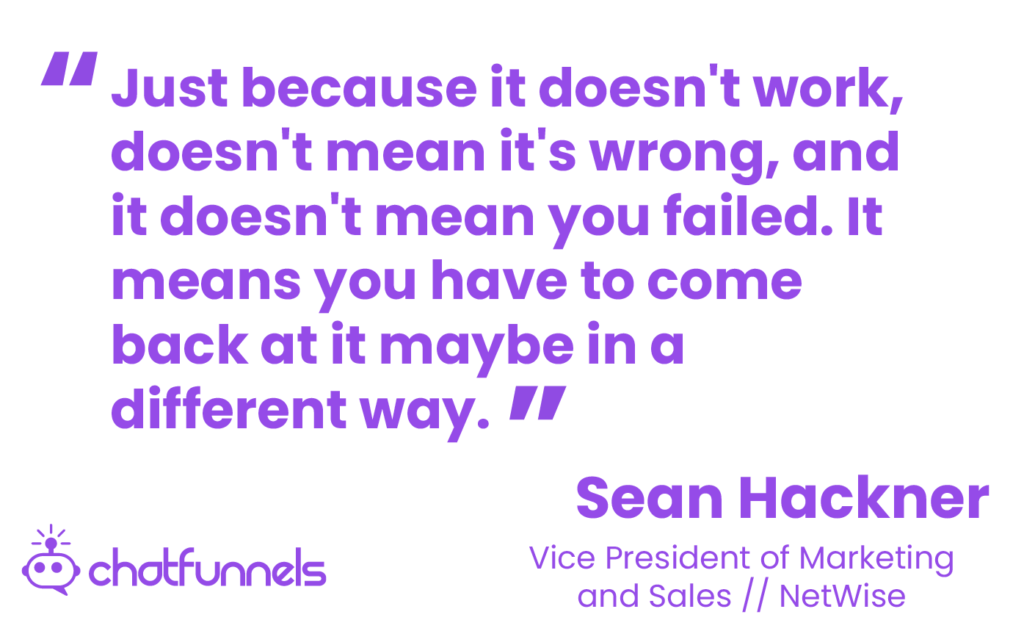
Sean Hackner 9:14
Being able to pivot, I think in any situation was something just because it doesn’t work, doesn’t mean it’s wrong. And that doesn’t mean you failed. It means you have to come back at it maybe in a different way. And as we grow up, we fail all the time. And I don’t know at what age where people start to think that failure is a bad thing.
What do you mean what age do you think where? I mean, because when we start out as a baby, we fail all the time, right? We learn how to walk, we stumble; we fall. And we stumble and fall through school. I don’t know what age it is where it automatically becomes this thing where you can’t talk about failure. No one wants to listen to failure. And that becomes taboo.
Billy Bateman 10:18
Yeah, I don’t know what that age is. But it seems like it might be at least creeping around high school age, you know? Yeah. Yeah, yeah. You know, you get towards where you’re about to graduate, you start to become very much, I think more self-conscious self-aware of what’s going on and, and you want to present you know, you want to market yourself as a success everyone does.
And, you know, people don’t want to necessarily broadcast Hey, I screwed up, I really screwed up here, you know? Or, or like, you know, if you’re on a, like a soccer team, and you play your season and you lose every game, you’re, you’re probably not going to tell everyone Yeah, we got our butts kicked all year, you know, didn’t even win one game.
Being Open about Failure
Sean Hackner 11:08
So, you’re 100%, right. Because when will our sales approach? And you never talk about failure, right? We want to talk about what’s working, what how are you winning? When failures come out, but no one wants to talk about it, like you said, so the sales companies that call and I have people solicit me all the time, and they said, you know, what, are you doing bad at, you know, what’s not working?
I’m like, well, if I knew that, you know, I’d fix it. Exactly right. So, I don’t want to talk about what’s not working, let’s talk about what’s working, and then maybe lead into that. But, you know, I think the sales game has become increasingly hard. It’s always been hard. But you have so many sales enablement, tools out there that help and support sales these days. So, it’s really different from those days when you are going door to door.
Billy Bateman 12:13
Yeah, no, it’s a whole different ballgame from going door to door. Like, you know, we can’t even I mean, it’s a struggle to get young kids that we hire at a school to dial on do cold calls. It’s just a different age, different culture. They’re all in on email, or even text message, but to dial is, is not in their DNA for most of them.
Sean Hackner 12:38
Yeah, good. Good point. Um, well, look, they don’t even talk on the telephone, right?
Billy Bateman 12:44
Yeah.
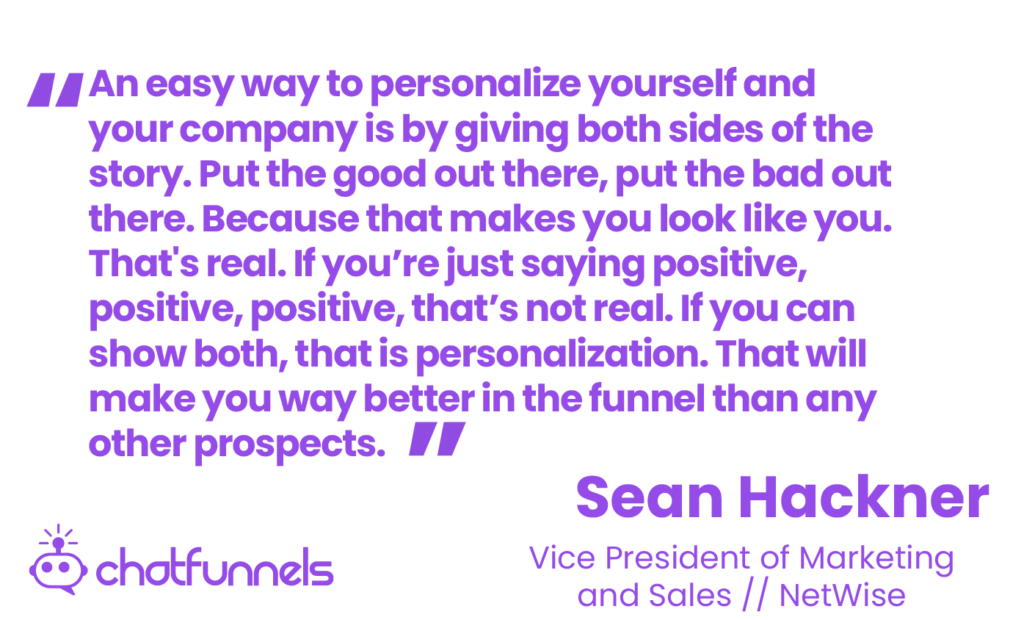
Sean Hackner 12:44
So, my kids’ text, or I don’t even know what platform they’re using nowadays. But they’re communicating. And they’ll text me. They use all these acronyms. And I have to text back. What does that mean? And that’s Oh, that means this, I mean, so that’s the new sales theme that’s come culture that’s coming up. So, you have got to, you can’t find it, you’ve got to adapt to it.
So having texting be part of your outreach, social media, LinkedIn, Facebook posting, they do it for themselves. You want them to do it for business. So, I think the latest stat from LinkedIn said, you should be doing 70% business 30% Personal making, so that you can see because we’re people behind the behind the camera behind the phone. So, they said that 7030 balance? We I think on Facebook, it’s reversed to say, maybe 30% business.
Billy Bateman 13:56
Yeah. And you know, it is in going back to LinkedIn and social media and failure. You hardly ever see anybody say, hey, we tried this, and it didn’t work. I’m like Dan, like, you know, when I got on LinkedIn this morning, and, you know, checked my messages, notifications, scroll through the feed for a little while. I can’t think of anything where people were not, you know, the kind of roses and sunshine that they were posting.
And that’s not really the reality of a job, a business of any life. Yeah, life. You know, like, we’ve got challenges every day, you know, you feel like, oh, I’ve got this problem solved. And often Intel, it’s, you’re like, I think I’ve got it all done. We just got to wait for this to happen. And then like that, you’re on square one. Something, something falls apart and you have to get back after it and figure out a new way to attack this. This challenge.
Personalization
Sean Hackner 14:56
Yeah, you’re right. I mean, there’s no listening. It’s not seeing the positivity and the, the positive quotes and all the good stuff, right. But we can resonate. If you be, like personalization, I was just listening to a talk about personalizing everything.
And an easy way to personalize yourself, your company, is by giving both sides of the story. Put the good out there, put the bad out there. Because that would make you look like you. That’s real. Yeah, if you just saying positive, positive, positive, positive. I mean, that’s not life, or it’s not real. So, if you can show both, that dictates that that is a personalization. And that will make you way better at the funnel than any other prospects.
Billy Bateman 15:56
I agree with going to even personalization and marketing. As you were talking about that. When we first started as a business, we were strictly consulting and helping people use different conversational marketing tools. And we thought we heard the same thing as, hey, you need to personalize everything. So, you know, like using the tools we have, we can see what companies are on the site. Or even sometimes if they’ve already chatted into an agent or a chatbot.
You have a first name and a last name for them. Well, we thought, hey, let’s hyper personalize this stuff. And if we know who it is, let’s greet them by their first name with the bot. Well, what we found was, it was creepy is what people thought because we went from a pretty good engagement rate with the same customers, same website traffic to almost nothing because you get to that site and you’re like, whoa, and it says, hey, Billy, you know, welcome back to XYZ company.
I can’t even myself when I thought about, I was like, that’s a little bit on the creepy side. So, we backed off, and you know, never our best practice now. Like, hey, you can welcome a company and realize, hey, we know, Shawn is from NetWise. So welcome back net wise. But, yeah, like we definitely learned a lesson there. On personalization, you can go too far.
Sean Hackner 17:26
Absolutely. Because when you go too far, people feel like you’re infringing. Right?
Billy Bateman 17:32
Yeah.
Sean Hackner 17:34
So, you know, they’re looking for a product. And then they watch it on their smart TV, and then they see it on their phone. And then they see it all over and they go, well, I don’t want that. Well, you know, you’ve put something out there that you want this. So that that’s the balance, it’s tough, you’re not going to please everyone. If you go with that philosophy, try to make everyone happy.
It’s a that, that that’s a setup for failure, right? Uh, you know, everyone, everyone happy, you just want to try and do your best. And when it’s not working, you know, just tell the customer, there’s nothing like honesty over the phone. You know, when we have a meeting and something doesn’t work or something’s not working, get on the phone, talk to them say listen, I’m sorry. You know, it’s like sales saying I don’t know if you can, it’s okay to say I don’t know. And to come back with an answer.
Being Open and Honest with Customers
Billy Bateman 18:30
Yeah, I agree. I agree. You know, something that came to mind, as you’re talking is, my team will tell you that I’m obsessed with Toyota as a company, and I drive on as well, but, but they have a few just business practices that I love. And one of them is that I always talk to my team about this. And they always laugh when I’ve got a new video to show them when I’m doing my training. But it’s kaizen. And it’s continuously improving.
And, you know, we’re building software, they build cars. At first, everyone was like, what are you talking about Billy, but it’s the same principle of, hey, we should never just say, you know, like, we don’t do things that way a ChatFunnels when we have an idea. Like, that’s just not how things are done.
We are always open to new ideas to improve and realize, hey, you know, we were doing it one way and maybe that worked for a little bit or worked for a long time. But we’ve always got to be open for ways to improve, otherwise you are going to be left behind and we’re going to be talking about man if I’d been willing to pivot or just adjust a little bit. This would not have been a failure; we probably would have been a success.
Sean Hackner 19:49
Yeah, constantly evolving, right? Because if you do not you will eventually die. And for you to have that outlook and discipline Pay the three your team. It’s incredible to see leaders like you’re doing that because, you know, there’s a lot of them that are not that are not giving people the opportunity to improve.
You know, we built out this marketing team and the people we have on it too in particular, Adam, my comms director and Mark, that these guys are just the smartest guys constantly improving constantly bringing knowledge to it. Always hire smarter than you. Because you don’t know everything. And there’s always someone smarter. So that’s my philosophy. I don’t care if you’re hiring, who you are hiring, always hire smarter than you.
Billy Bateman 20:48
Well, let me ask you this. How do you how do you go about finding smarter people than you to hire Sean?
Who to Hire
Sean Hackner 20:55
Well, that’s a tough one. But how we started was we went to our network. We went to our employees, existing employees who already have some of the brightest brains. And we expanded that network to the next network to the next network. And that’s how we’ve hired for the last over for the last good couple of years. Yeah, yes, sometimes we’ve gotten out of that. Because there’s something specific, that we needed a specific role that we needed that we needed to advertise before.
But on the most part, someone at the company knew someone who knew someone, and when they came, you know, that if you’re looking for cheap, you know, you want to pay peanuts, you get monkeys, right? Yeah. And you’ve got to pay what the, what you want from the job, and you’ll get happy employees, you’ll get employees willing to go for bat. Willing, and give them the forum to be able to do that. Don’t stifle them, when they come on board, give them the give them that open slate where let them come with ideas, let them take the lead on a lot of stuff.
And, you know, we’re going to have hiccups along the way. But that’s when you can have that dialogue and say, okay, what worked, what didn’t work? What do we have to do to improve? And, again, that relationship is, is a tough one. I mean, that leads to another subject is relationships in business, which is crazy. And now with everyone working in, in different states and locations. Even harder, because it’s all over this video, which is very different to pose into personal. actually, meeting them no water cooler. Yeah. I think business today is juggling a lot of different things. You know, my dad and grandfather, my especially my grandfather would have been, I don’t know, you know, I mean, he would have adapted. It’s very different even to five years ago.
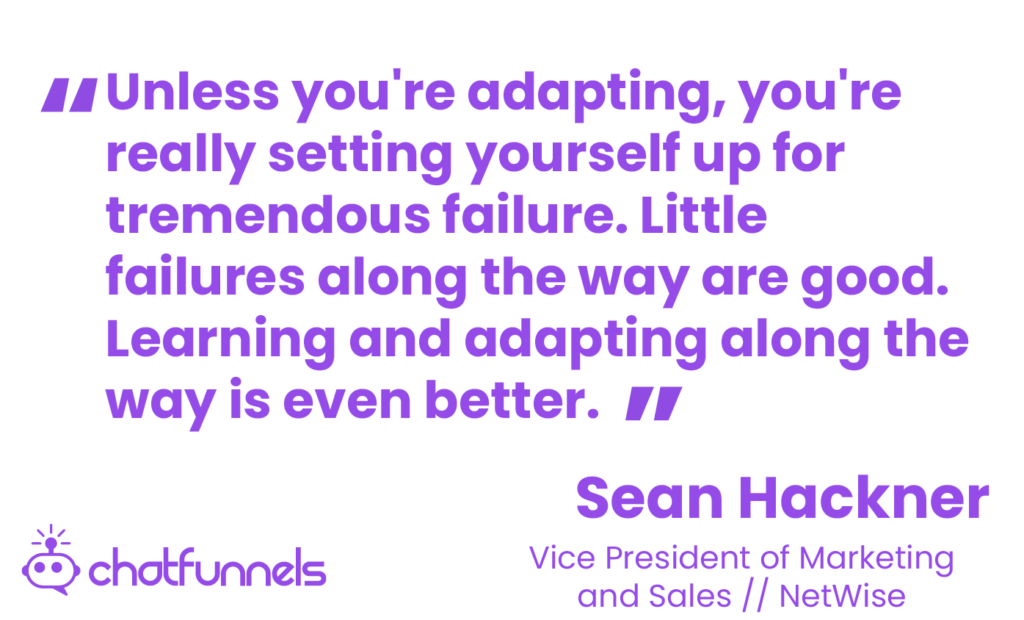
Billy Bateman 23:29
Yeah. No, very, very different. My first job, I remember in the office, every day you’re coming in, you have got to show up, even if you don’t have anything to do, you have to be there till five o’clock. Five o’clock. Like, I mean, they, I did my job. But man, after about a year, I was learning how to build fly fishing rods at work, because I asked him was like, you got anything else for me to do?
And they’re like, no, you’re doing great. Like, just do what we’ve been given. I was like, well, I got to be here. So, I’m watching videos, and then going home and building fly rods because you had to be in the office. And it was just a whole different world. Whereas, you know, ChatFunnels, we’re kind of a hybrid environment where everybody does with local, we have an office, you’re in the office more often than at home, but we you know, I’m at home today. I’m obviously not in the office.
Sean Hackner 24:29
We’ve got smarter so think of your manager if he had said I mean if he could get a couple more hours from you and take you and put said Hey Billy, what do you think about this put you on a project or utilize that. But we weren’t thinking like that. We were hired to do one, two and three, as long as you do with doing one, two and three, no one can yet. But nowadays, you can get so much more out of the employees.
With these hybrid working environments, you know, not stuck stick, sticking to a specific time, allowing them to do a little bit differently, which is very tough because as sort of an old school guy, I had to adapt. Otherwise, I would die, right? Yep, we have to adapt to this new way of the way the employee looks at the business. And they look at it very differently than when I was an employee. that the employees are dictating sort of the business today a little bit more than in the past.
They weren’t doing it at all. The business dictated everything. Yep, you do this, you do that. Nowadays, we have this. It’s like an ecosystem. It’s a relationship. And listen, I love it, man. I mean, I love working with smart people that are all motivated, that we all are rowing in the same direction, which is hard to find in companies these days.
Billy Bateman 26:06
Yeah, especially the bigger your company gets, keeping everyone going in the same direction is increasingly a challenge. But you can do it.
Sean Hackner 26:15
Yeah. You know, you can do it, you’ve got to learn. I mean, like, I slack, I mean, we are use Slack even at my past company, and we’ve been using it for. So, you know, five years ago, it wasn’t even that long, four years ago, five years ago, which was like, when it was just starting, no one was using it. Nowadays. It’s a communication tool. Not only are you using it internally, but you can have your customers jump onto a Slack channel. You can have your vendors, you can have it you again, you’re adapting, right? So, unless you’re adapting, you’re really setting yourself up for tremendous failure. So little failures along the way are good. And adapting along the way, learning and adapting along the way is even better.
Billy Bateman 27:12
Agreed. Agreed, man.
Sean Hackner 27:15
I want to get back to the you said about Toyota. So yeah, first car. I worked for my dad, and I used to drive. I don’t even see them in the States. It was a Toyota 1400. I think it was the engine or was this tiny little two-seater pickup that fit three people in this tiny little 1400 like us to just get up the hills. But you know what? lost it forever. Yeah,
Billy Bateman 27:49
I think here we just call them the Toyota pickup. They sold them in the 70s and the 80s. And now that’s become Tacoma. But when I was in high school, that’s what I wanted, because they got good gas mileage, and it was still a truck, four-wheel drive.
Sean Hackner 28:07
And we use those to buy one. Yeah. And we use the Land Cruiser, the Toyota Land Cruiser in the bush. Those things are indestructible. Yeah, those things go and last forever. Those are great, great, great cars.
Billy Bateman 28:20
Yeah, I mean, in Toyota, like they build them like this on purpose, you know, and I want the same thing from our products. We want something that’s robust. We know who we’re trying to serve. And we continuously improve it so that it doesn’t break down on our customers. Like, it’s always there. It’s going to work, and they can rely on us.
Sean Hackner 28:43
I think Billy, I think that’s a whole nether topic because everything made today is built for failure within a certain time period. Yeah, yeah. But I’m glad to see that you are building something to last like us here at NetWise, our platform, we are constantly evolving it, learning from the customers getting feedback. So, I appreciate you having me on and allowing me to throw a couple of nuggets out there.
Billy Bateman 29:10
I love it, man. Thank you. And then if anyone wants to get a hold of you and continue the conversation or learn more about net wise, what’s the best way for them to reach out?
Sean Hackner 29:18
LinkedIn? You know, I have it on one of my screens open all the time and am always happy. I’m helping a lot of people that come to me with questions. Love to share knowledge. So just look for Shawn Hackner on LinkedIn and be more than happy to help you out with an answer to any questions?
Billy Bateman 29:40
Okay. Thanks, Sean. And we’ll chat later.
Sean Hackner 29:44
Billy. Thank you
